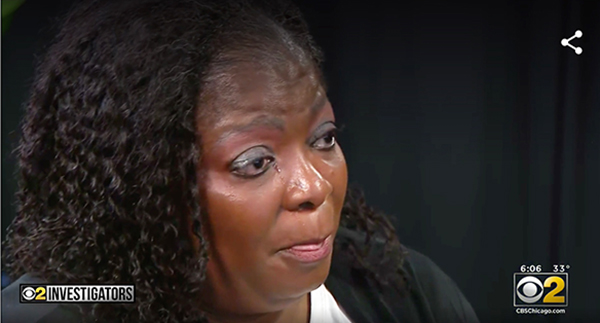Other Voices:
Anjanette Young reminds Black women of their ancestors who stood naked on a slave auction block
by Dahleen Glanton, columnist for the Chicago Tribune
| revcom.us
This column originally appeared in the Chicago Tribune, December 21. We are reposting here with the permission of the author, Dahleen Glanton.
Once upon a time in America, Black women routinely were forced to stand naked on a slave auction block in front of hordes of white men who were trying to decide if each was worth the price they were asked to pay.
Often, her young children would cling to her legs as she was sold separately to the highest bidder. She would wail in despair at the thought of losing her babies. But her cries were unheard because she and her children were deemed less than human.
I thought of that scene as I watched the video of Anjanette Young for the third time.
The first time I saw the video of this African American woman standing naked in her living room as a group of mostly white male police officers swarmed around her, seemingly oblivious to her exposed breasts and genitals, I burst into tears.
I didn’t know why I couldn’t stop crying. I couldn’t articulate why the image struck me so deeply. I wanted to scream. Instead, I rested my head on my desk and sobbed.
Most African American women know that we could have been Anjanette Young. Any one of us, regardless of our status in life, could have been undressing in our bedroom after coming home from work and be startled by the noise of police bursting through our front door.
We always have known that Black women’s lives aren’t valued as much as white women’s. America doesn’t mourn for us the way it mourns for murdered or missing white women. White women aren’t forced to stand naked in front of men.
But my reaction and that of many Black women to this video was more visceral than normal. The sight of Young standing naked with her hands cuffed behind her back, begging for someone to have mercy on her struck Black women to the core.
The video awakened something in our unique African American female DNA. It struck a nerve buried so deep that few events are able to touch it. Not only did we see ourselves in Anjanette Young, Anjanette Young became our slave ancestors.
She is Coffey, the 45-year-old African woman with no last name who arrived in Beaufort, South Carolina, in 1830 on the slave ship J.D. Morgan. She is 13-year-old Barbury, who arrived at the same port on the slave ship George Washington, six days later. And she is 9-month-old Susan, who arrived in Augusta, Georgia, on the slave ship Hamburg in 1826.
Anjanette Young is every Black woman listed on the National Archives slave manifests. She is every Black woman who was placed on an auction block and stripped of her dignity.
The modern African American woman is 155 years removed from slavery, but the blood of our ancestors runs through our veins. It is as much a part of us as our lungs, our heart or our limbs. It makes us who we are.
Our ancestors’ DNA, with its strength and fortitude combined with agony and degradation, sits dormant inside us until an experience or event awakens it and reminds us of how we came to be.
Young provided African American women that moment. We felt her pain and we cried for her, uncontrollably.
To those police officers, Young was nothing more than an object, devoid of all feminine value, undeserving of respect, dignity or even pity.
Like the female slaves, her only value was in what she could provide for them. They needed information from her about a suspect they wrongly believed she was harboring.
She tried to tell them at least 43 times that they were in the wrong place. But they didn’t hear her. There was no reason to listen to someone as insignificant as she.
The officers decided Young’s worth, just as the crowd of white men decided the value of the enslaved Black women they intended to buy. Nothing Young said was of any importance, because as far as they were concerned, she had no value.
So she stood naked in her living room with at least nine police video cameras noting every curve of her body. Some of the officers must have known it was wrong.
An officer walked over, stood directly in front of her and did nothing. Eventually, someone draped a short jacket around her shoulders, but it did not cover her private parts. Someone else tossed a blanket loosely over her, but with her hands bound, she could not hold it up.
At one point, an officer secured the blanket. But by then, the damage had been done. The humiliation had set in too deeply.
Recently, Young set off on a journey to tell the world what happened to her. She chose to hold her head high rather than wallow in shame for something she could not control.
She decided that her story had to be told because silence would only benefit those who deemed her irrelevant. Simply telling the story was not sufficient. People needed to see the video themselves.
Perhaps she channeled the strength of the brave Black women who stood naked on the auction blocks centuries ago. Perhaps she felt the blood of her ancestors running through her veins, prodding her to do what she must to bring about change.
Our ancestors were powerless to say, “No more.” But Anjanette Young was not. She spoke up, and America was forced to listen.

Anjanette Young
CBS 2 Investigation: My Name Is Anjanette Young
Get a free email subscription to revcom.us:

